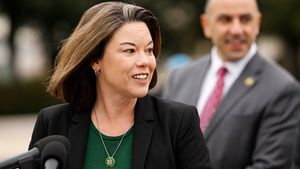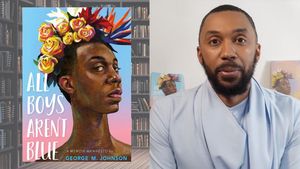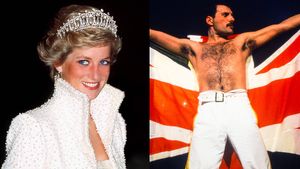After a television journey that’s lasted seven years, five seasons, and 65 episodes, the gays, queers, trans nonbinary, and even the straight characters of Star Trek: Discovery sashay away with a bang!
The first two action-packed episodes of the 10-episode final season of the science fiction drama are now streaming on Paramount+ (and for free on YouTube). The storyline this time around is pure adventure, mystery, intrigue, and a search for ancient clues (no more spoilers!) that continues this series’ intense focus on the characters’ relationships, but also calls back to Star Trek’s roots.
“There is action,” said actor Doug Jones, who plays the alien Saru. He paused briefly as he searched for the right word in a recent interview with Out. “Action mixed with, with family. The relationships in this show are so deep by now, by season five especially, that the action means something when there's so much at stake between all the characters and why we love each other and want to care for each other.”
Love was a theme repeated by everyone connected with the series who sat down to speak with Out recently.
“That's what we strive for in every episode and every season,” lesbian showrunner Michelle Paradise told Out. Discovery was nominated five times for Best Drama at the GLAAD Media Awards and won in 2021. Paradise is especially proud of how her series has been a beacon of LGBTQ+ representation, boasting a cast of at least seven out actors who are gay, queer, transgender and trans nonbinary playing roles not all that different from their actual lived experience.
“The representation is so important to us, and it's very, very intentional,” said Paradise. “Every season, every episode, it's intentional.”
When the series launched in 2017, it was intended to be a prequel to the original Star Trek series of the 1960s, set at least a decade before the 23rd century adventures of Capt. Kirk and Mr. Spock aboard the U.S.S. Enterprise. Discovery was the first spinoff whose central character was not a starship captain, and the first to revolve around the misdeeds, keen insights, and growth of a Black woman.
Sonequa Martin-Green plays Michael Burnham, a human orphan raised on Vulcan, the never-before revealed adopted sister of Spock, and Starfleet’s first mutineer — who did ultimately rise to the rank of captain by the end of the third season.
On a red carpet in 2017, Martin-Green told this reporter her hope was to stand up as a role model in the same way Nichelle Nichols did in the very first Star Trek series, as Lt. Uhura. She told Out that Nichols very much inspired her own performance in this leading role.
“I have been very grateful to stand, and I think I can say that I have at this point,” she said. “Everything that she did, the impact she made in front of the camera and behind it, in society, my goodness! She made it so that I could stand with her.”
When Star Trek: Discovery’s third season propelled the crew of the Starship Discovery into the 32nd century, it introduced two new queer characters: teenage lovers Adira (played by Blu del Barrio) and Gray (played by Ian Alexander), who are reunited in this fifth and final season. Del Barrio has a recurring starring role and Alexander returns as a guest star in the third episode. Although Alexander previously identified as a trans man, they and del Barrio told Out in 2022 they are both trans nonbinary.
For del Barrio, that evolution of identity occurred just as much in front of the camera on a soundstage in Toronto, as it did behind the scenes.
“I think it's been a really scary thing to do it through this show and to do it so openly and for lack of a better word, but transparently,” they told Out recently. “And at the same time, I'm incredibly grateful to have been able to start and go through the beginnings of my transition while also playing this character.”
As Star Trek’s first-ever recurring gender nonconforming character, and as a 26-year-old exploring their own trans nonbinary identity, del Barrio told Out they were glad for the good that it did for young viewers back on 21st century Earth to see themselves on that same trajectory.
“It really feels like a sacred thing to me,” they said. “This piece of work feels really sacred because there was a huge change going on for me emotionally. Medically transitioning, all of that was during the last four years. It's like a really crazy snapshot in time.”
But becoming a role model was never something del Barrio sought, they said.
“I really did not think that I deserved to be the person to do that. And I think I've now realized that I did not see other trans people in the media. I didn't necessarily see myself, someone that was maybe a little bit anxious and scared and nervous.”
Actor Wilson Cruz told Out that Star Trek: Discovery provides an answer to that feeling of anxiety that so many share in these troubled times.
“I think the best possible word, given this moment culturally and politically, is resilience. I think, if we can inspire you to be resilient in this moment and to show up for your communities, then I will have done my job.” Cruz plays Dr. Hugh Culber, the gay partner of and fellow “space dad” with Anthony Rapp’s character, Commander Paul Stamets.
“Wilson has used this phrase that I'm going to borrow from him,” Rapp told Out. “One of the things that this show is doing, is showing that we're in the future. The fact that two of the main crew members who are really good at their jobs have been there from the beginning.” There’s never actually been an episode dealing with Culber and Stamets’ orientation; it’s just a given that they are a gay couple, as it would be if they were straight.
“And then we brought into our family and crew this brilliant young person. Adira, that we keep kind of saving the universe, that we're among the ones that really make a huge difference. I do think that this sends this message loud and clear that, ‘Hey, we're still alive, we're still going to be here, hundreds of years into the future. We've always been here, throughout history, some of the major minds of the world have been queer folks throughout history. And that will continue to be the case.’”
Rapp, who was in Tokyo performing his one man musical Without You at the time of our interview, said he and Cruz have heard repeatedly from fans the positive impact they’ve made.
“We've heard from so many people over these several years who've been profoundly impacted by that representation, by seeing the way that we are with each other and how much it's helped them, either young people themselves that were coming out, or just came out, seeing themselves in Adira, and parents of young people who are like Adira. Just seeing that it has been profoundly meaningful to them, that in turn, is very meaningful to us,” said Rapp.
His next statement is especially prophetic given the recent controversy over the International Transgender Day of Visibility. “It’s essential,” Rapp said. “Visibility is essential to the safety and equality of queer people. It always has been, and it is what has made the difference over the last 50, 60 years. People finally were saying, ‘We're here, we're queer, get used to it, etc.’ It's taken a while. In some places, there's still very far to go. But we've taken as much ground as we have because of that visibility.”
A character who became less visible in the prior season was Ensign Sylvia Tilly, always played with aplomb by out queer actor Mary Wiseman. And, without providing any spoilers, it’s a joy to say she is back and better than ever. “Super fun,” is how Wiseman described to Out what it’s like to return in a different capacity than what fans have seen Tilly do before.
“I think it's kind of nice for Tilly to be both inside of it and outside of it,” she said. “It just feels like she has a lot of autonomy. And for me, it's great, because I get to be there, and it's a nice character development that Tilly gets to come in almost as a consulting expert, instead of being just part of the crew, as she always was. I think it orients her in a different way, where she has a lot more agency, and has gained a lot of confidence by going off on her own and teaching at Starfleet Academy.”
Starfleet Academy is the name of the next Star Trek series, now in pre-production, under the supervision of executive producer and man in charge of all things Trek, Alex Kurtzman. He talked with Out about what made Discovery far more LGBTQ+ inclusive than any other iteration of the 58-year-old franchise.
“I think you hire different showrunners, so that they will give you their vision of Star Trek, right? Nobody wants the same vision for every show,” said Kurtzman. “There has to be certain common denominators, right? Trek is about an essential vision of optimism and inclusion and a sense that our future can actually be bright, even in times of darkness. But beyond that, part of what I love about Star Trek is that each writer of each show brings their own interpretation to it, and I think that's how it stays fresh. So, in no way, shape or form am I taking credit for being the one who's doing all of it, because I couldn't. This show doesn't exist without Michelle, just as every other show doesn't exist without the showrunners and all the amazing writers and crew that work on them.”
“That people are feeling seen and that people are seeing themselves, amidst all of the fun and the cool storytelling and the action and the adventure, that's wonderful,” added Paradise. “That is a wonderful thing about this show. And hopefully that's what people think of, among many other things, once the show finishes its run.”
 James Dimmock/Paramount+
James Dimmock/Paramount+
Even when the characters are in a binary male / female relationship, Star Trek: Discovery finds a way to draw parallels to contemporary issues of love across cultures and other barriers. Can a Kelpien ambassador and a Vulcan president find love in the 32nd century?
“Saru and President Karina, played by Tara Rosling, has been such a fun journey, and I think they're both in love for the first time ever as grown adults,” said Jones. “They've had such a sense of duty all these years that now it's like, ‘Wait, but my heart beats as well, so I can have both!’ That's been lovely to explore and unfold and see. Can career and duty and diplomacy and all of the things that they represent, can that also coincide with ‘I love you,’ and me finding out that I think it can.”
David Ajala is back as well, in the role of Cleveland “Book” Booker, also introduced in the third season. “I love the fact that Michael Burnham and Cleveland Book have been through so, so much, but yet they're in a place where they're able to just try to build bridges.”
The ending of the fourth season saw Burnham and Book separate, and the tension between them is palpable in the first four episodes of season five screened for reporters. Ajala said love is a central theme this go-round, in addition to all the Indiana Jones-style action.
“Love, that's my anchor,” he said. “Love has more currency when it is expressed in action. And I think going forward in season five, Cleveland Book is in a position where he's on a redemptive journey and his love is shown in his actions. He is a student of life and a student of love.”
Out asked Ajala where he stands in terms of the LGBTQ+ community, and the well-known mantra, “Love is Love.”
“Absolutely! You said it. So, I stand in the middle of all that love which everyone is deserving of.”
Martin-Green, the series lead, took the opportunity to frame the series’ end as the end of her own personal evolution, standing up as Nichols did, as Kate Mulgrew did, as Avery Brooks did. Each of them in their own way was a pioneer in the Trek universe, expanding what it means to be seen, and to lead.
“I understand now because of the journey that I've taken, because my journey as Sonequa has paralleled Burnham's in a lot of ways. And there's been so much evolution and maturation and growth. I understand now that I do stand, and that that is why the people before me went through what they went through, that they would want me to stand freely, they would want me to stand confidently. And I understand that that's what I do, and that's what I will continue to do in honor of them, and in honor of whoever might come after me.”
When the cast of Star Trek: Picard was introduced at New York Comic-Con in 2019, Martin-Green took a seat all alone in an empty Madison Square Garden theater mezzanine, watching from afar, but spotted by this reporter. For this story, Out asked her if she had any idea back then what her work on Star Trek: Discovery would make possible: The launch of not only Picard but four other Trek series, namely Strange New Worlds, Prodigy, Lower Decks and now Starfleet Academy.
“Oh, my goodness! We just never in a million years would have imagined,” said Martin-Green. “I don't think any of us could have imagined what we were going to be doing. You know, the fact that we were making television history, with me, with so many others, with our diversity, the fact that we were innovating the franchise and pushing it forward, doing it justice. Now, we've become this mothership. Apparently, fans call this, this time is now called the ‘Platinum Age.’ And so, we're the mothership of the Platinum Age, and now we have our own children, and that is mind blowing. It's mind blowing.”
Platinum, with a whole lot of glitter and rainbows on top.
Season 5 of Star Trek: Discovery is now streaming on Paramount+, with new episodes dropping every Thursday.


































 James Dimmock/Paramount+
James Dimmock/Paramount+






















